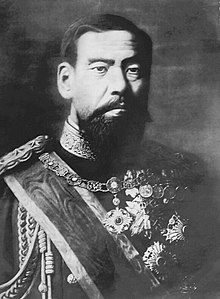Emperor Meiji of Japan
| Meiji 明治天皇 |
|||||
|---|---|---|---|---|---|
 |
|||||
| Emperor of Japan | |||||
| Reign | February 3, 1867 – July 30, 1912 |
||||
| Enthronement | September 12, 1868 | ||||
| Predecessor | Kōmei | ||||
| Successor | Taishō | ||||
| Shoguns | Tokugawa Yoshinobu | ||||
| Prime Ministers | |||||
| Born |
November 3, 1852 Kyoto, Feudal Japan |
||||
| Died | July 30, 1912 (aged 59) Tokyo City, Empire of Japan |
||||
| Burial | September 13, 1912 Fushimi Momoyama no Misasagi (伏见桃山陵), Kyoto |
||||
| Spouse | Masako Ichijō | ||||
| Issue Among others... |
Yoshihito, Emperor Taishō Masako, Princess Takeda Fusako, Princess Kitashirakawa Nobuko, Princess Asaka Toshiko, Princess Higashikuni |
||||
|
|||||
| House | Imperial House of Japan | ||||
| Father | Emperor Kōmei | ||||
| Mother | Nakayama Yoshiko | ||||
| Religion | Shinto | ||||
| Signature |  |
||||
| Full name | |
|---|---|
| Mutsuhito (睦仁?) |
|
Styles of The Emperor |
|
|---|---|
 |
|
| Reference style | His Majesty |
| Spoken style | Your Majesty |
| Alternative style | Sir |
Emperor Meiji (明治天皇, Meiji-tennō?, November 3, 1852 – July 30, 1912), or Meiji the Great (明治大帝, Meiji-taitei?), was the 122nd Emperor of Japan according to the traditional order of succession, reigning from February 3, 1867 until his death on July 30, 1912. He presided over a time of rapid change in the Empire of Japan, as the nation quickly changed from a feudal state to a capitalist and imperial world power, characterized by the Japanese industrial revolution.
At the time of Meiji's birth in 1852, Japan was an isolated, pre-industrial, feudal country dominated by the Tokugawa shogunate and the daimyo, who ruled over the country's more than 250 decentralized domains. By the time of his death in 1912, Japan had undergone a political, social, and industrial revolution at home (See Meiji Restoration) and emerged as one of the great powers on the world stage. The New York Times summed up this transformation at his funeral in 1912, with the words: "the contrast between that which preceded the funeral car and that which followed it was striking indeed. Before it went old Japan; after it came new Japan."
...
Wikipedia
